
An excellent patch of reading here, kicked off by a book which, half way through I was certain would be my favourite this year. Maybe I didn’t love the way it ended, but boy, what a ride it was. Eileen (2016) by Ottessa Moshfegh was amazing – a self loathing young woman is drawn into a crime, the reader being blind-sided (mostly). I won’t say any more, but I’d recommend it to anyone really – 4.5 stars.
Last Man in Tower (2011) by Aravind Adiga (author of White Tiger) was solid, too. Fairly dense and long, I was pulled along easily by the sanctity of Masterji, and the coercive and duplicitous residents of the soon-to-be-developed Tower A of the Vishram Co-operative. The ability of money to bring out the worst in people, gave this book a depressive feeling, but the characters were well fleshed out and it’s all pretty believeable. 4 stars.
My god I loved The Woman in White (1860) by Wilkie Collins (and not just for the divine 1980 Penguin paperback cover). Published serially with sometime collaborator Charles Dickens’ A Tale of Two Cities in Dickens weekly publication All the Year Round, both novels were smash hits at the time. At 650 pages, who knows how many editions were needed to get through it. Italian Count Fosco is the star character, but “the first great detective novel” featured quite a few memorable types, such as the eccentric, hypochondriac Mr. Fairlie, the mysterious Mrs Rubelle and the wonderfully pragmatic Mrs Catherick. A month or two later, I can still recall large sections of it, which is surprising. I couldn’t help but feel for poor Marian, who seemed to spend half her time cheering up various parties and who never seemed to get lucky in anything herself. Masterful – 5 stars.
Australian true crime history written by Gideon Haigh, with a recommendation by Gerald Murnane? – Yes please. Certain Admissions (2015) was the first non-cricket related one of his I’d read, but I had no doubts, and wouldn’t hesitate to read his “The Office: A hardworking History” or other dry ones he’s done to date. Towards the last third of the book, I did get a bit mixed up between some of the characters, as the cast (and additional cases) grew, but this 1959 story of the Albert Park beach murder of a girl had the customary research Haigh is famous for, keeping me interested despite the limited scope. John Kerr was eventually released from Pentridge in 1962 as “innocent” but I left the book think that high powered Lee Murray outdid himself lobbying and harrying to have a guilty debonair dresser exonerated. We’ll never truly know. 4 stars.
I remember almost nothing of Beginners by Raymond Carver (a series of 17 short stories, restored to their longer pre-edited original selves from 1981). I know I enjoyed it, but I’m only giving it 3 stars. Haha.
Once I heard it on a podcast, I then found similar references in other places too. I simply had to read Agatha Christie‘s “best novel” Endless Night (1967), and this silly compulsion drove me to purchase a very poor copy for wait-for-it $8 at the longstanding Magpie Books in Woolgoolga on hols. On the whole, it was pretty easy to like, and the big surprise, when it came, was probably massive for its time. I don’t think I’ll be reading her whole back catalogue though – 3.5 stars.
Peter Carey‘s A Long Way from Home (2017) was something Kim found in the laundry at Woolgoolga in great condition, although with it’s terrible front cover (containing a mispelling of “Trial” on the side of the car) I had low expectations. I hate to be the sort of person who says (like another reviewer) that once the 1950s Redex car race around Australia was over (i.e. the action bit), it morphed into an entirely different novel, but I absolutely felt this too. Part of me felt embarrassed that when the novel really honed in on the time when Willie left the race, and found his aboriginal history (and stayed) it became a bit forced and heavy handed. I loved many of the earlier sections but the earnest last quarter soured it a little for me. 4 stars.
Probably the only full price book I’ve bought in a few years (after all the Op Shop bargains that have come my way), it was baffling to me that after 104 pages I put The Sun Walks Down (2022) down. There are 4 and a half pages of superlatives for this Fiona McFarlane 1880s Australian novel, not including the front and back covers, and I felt almost nothing about any of the characters (or the plot or mood within). The writing was bland. This was straight after reading Peter Carey, who got my attention effortlessly. Mad! 2 stars.
Train Dreams (2002) – I think I only read this very short 116 page book by Denis Johnson to quickly get my pile smaller, but it was quite a gem. It’s the story of a Washington lumberman in the early 1900s who is widowed and begins to feel his body age due to his working history and lifestyle. There are gentle digs at progress and civilisation, but at its heart is reflection and loss and it was really powerful. Loved it. 4.5 stars.